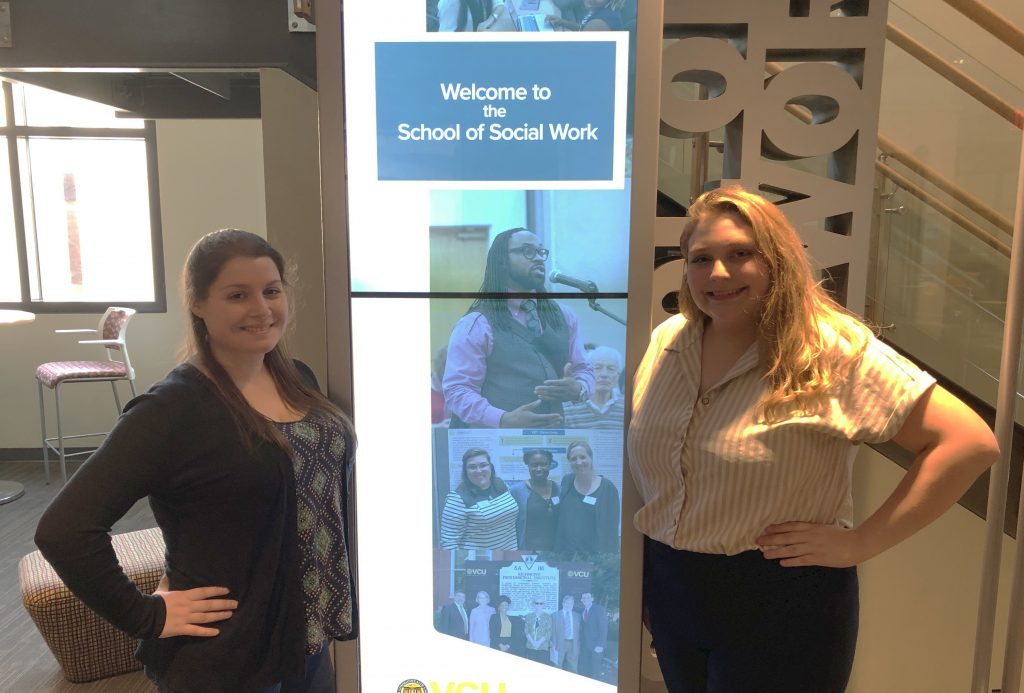M.S.W. students take a flyer, find reward in human-animal interaction class

It started with a flyer social work students Taylor Wilkerson and Elena Papathanassiou saw for a class they thought would be interesting. It ended with a short feature story about the classmates’ work published in a statewide newsletter on aging.
The course was Human-Animal Interaction Across the Lifespan, a master’s level elective developed and taught for the first time by Shelby McDonald, Ph.D., an assistant professor at the VCU School of Social Work, in Fall 2019. The class, which explores the dynamic of overlapping welfare between humans and animals, featured a visit from Dogs on Call, a therapy dog program through VCU’s Center for Human-Animal Interaction.
“It seems like these kinds of courses were always offered at other institutions, but never here at VCU,” Wilkerson says. “I saw the flyer hanging up here in the social work building. And because I have worked at VCU Health, I would always see Dogs on Call, so that was really my big draw, knowing that was an aspect that could be incorporated into social work. That’s really what drew me, just learning more about human-animal interaction, and then learning about how that could be part of a career.”
“I also saw the flyer, and I was like, animals and social work, those aren’t typically put together; I’m interested, I want to know more about this,” Papathanassiou says. “And through the course, we talked a little bit about environmental justice, which was not something that we really addressed in any of my other classes – which I thought was really cool and really kind of opened up what social work could be. … It’s not as narrow as, you’re going to either be a case manager or therapist, especially as a clinical student; that’s kind of where we tend to end up. So I thought this was a really cool class to be able to see how different systems interact, especially through social work.”
Students in the class prepared resource guides for different populations. Wilkerson and Papathanassiou, both in the clinical track, submitted their project, Human-Animal Interaction Benefits for Older Adults, to Age in Action, a quarterly publication of VCU’s Virginia Center on Aging and the Virginia Department for Aging and Rehabilitative Services. It was accepted and featured in the winter 2020 edition (PDF, page 13).”
“We focused on older adults and human-animal interaction,” Wilkerson says. “Both of us have an interest in that, and I’m part of a research group with VCU iCubed in gerontology health and wellness and aging populations. So I always tried to tailor a lot of my class projects to include older adults. This was a perfect intersection of how we can talk about older adults and animals. A lot of people think that’s a population that wouldn’t benefit as much from human-animal interaction, but there are a lot of benefits.”
“I’m more interested in the social isolation aspect of it,” Papathanassiou says, “and, of course, older adults are a huge population that face a lot of social isolation.”
Wilkerson found personal connections to the concepts she learned in class. “My dog passed away this summer,” she says. “It was a really emotional moment, but it also brought our family together. We talked (in class) about disenfranchised grief, and how when you lose a pet, it’s something that you might not always be able to fully talk about or get recognition for because people don’t see it as the same as losing a human. I think that was a lot of what made me want to take that class.
“In my field placement now, I’m at the hospital, and I work with bone marrow transplant patients. You can’t have pets up there, because they might bring germs or outside pathogens into people who are immune-suppressed. Once you take that class and think about it, it’s interesting how much you can really validate people who are upset because they’re missing their pets or we have someone that lost their pet while they were in the hospital. Having this education was nice to have been able to manage that better.”
Classmates John Bowles and Ashley Stupak also created a resource guide for VCU School of Social Work Students, One Earth, One Heart, One Health.
Categories Education, Faculty and staff, Students
Comments
I have seen first hand how the loss of our older dog almost killed my 89-year-old mother and how bringing a puppy into the house has rejuvenated her life.
Cheryl, thanks for your comments! Puppies are certainly a blessing!